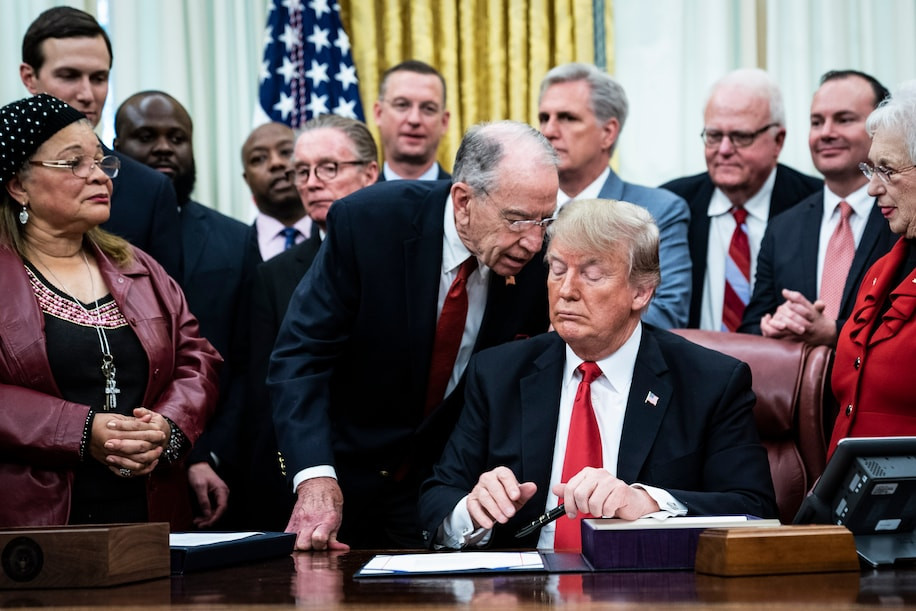
Date: 2025-12-12 Page is: DBtxt003.php txt00021080
The Trump Saga
Maybe worse than anyone imagined
The GOP’s fanciful defense of Trump’s DOJ plot

President Donald Trump listens to Sen. Charles E. Grassley (R-Iowa) during a bill signing ceremony in the Oval Office in 2018. (Jabin Botsford/The Washington Post)
Original article: https://www.washingtonpost.com/politics/2021/10/07/gops-fanciful-defense-trumps-doj-plot/
Burgess COMMENTARY
Peter Burgess
I do recall [White House counsel] Pat Cipollone earlier saying “That letter,” meaning the draft letter to Georgia, “is a murder-suicide pact. And it will damage anyone and anything that it touches.” And I remember some other specific comments along that line, but we kind of followed up on that saying, you know, “Do you want to be part of that?” And so very deep into the conversation, the President, who was very frustrated, and he just shook his head and he said, “All right. We’re not going to do this.”He looked at Jeff Clark and said, “I appreciate you being willing to do this. I appreciate you being willing to step up and take all the abuse, but the reality is it’s not worth the breakage. We’re going to have mass resignations. It’s going to be a disaster. You’re not going to be able to get this stuff done anyway, and the bureaucracy will eat you alive. So we’re not going to do this.” That’s not “this is the wrong thing to do.” That’s “this won’t work.” The other key point is that this plot was apparently very much set in motion. While Trump never actually fired Rosen, it did get to the point where Clark, according to Rosen’s testimony, told Rosen that’s what had happened. The situation was only defused after Rosen demanded to actually get the news from the president. Per Rosen’s testimony, this took place Jan. 3:
[Clark] told me, at that point, the reason it was time-sensitive when he called me earlier was that he had talked earlier with the President, and the schedule — the schedule had moved up and that the President had decided to offer him the position, and he had decided to take it. So that I would be replaced that Sunday, and the Department would chart a different path. ... So after some of that conversation, I told him, “Well, here’s the thing, Jeff Clark, my subordinates don’t get to fire me. So I’m not accepting what you’re telling me, that you’re going to replace me. I’m going to contact the President and tell him I need to talk with him.”It even got to the point where Donoghue said he began collecting his things in his office, anticipating that Rosen’s termination meant he would be resigning because he wouldn’t serve under Clark. Rosen and Donoghue moved to evaluate just how many other senior DOJ officials would also resign with Rosen’s impending termination. Shortly thereafter, the meeting took place in which it was made clear to Trump that this would lead to mass resignations, including some, according to the testimony, in the White House. And he backed down. In the end, it’s almost eerie how much this carries parallels to the Ukraine situation. Back then, Trump delayed aid and eventually released it — but only after a whistleblower complaint was circulating that accused him of using the aid for leverage. The jig, it appeared, was up. To quote Donoghue’s recollection of Trump in his testimony on the DOJ scheme, it was “going to be a disaster,” and he was not really “going to be able to get this stuff done anyway.” And there’s another facet of the Ukraine situation worth remembering: While the GOP highlighted the eventual release of aid in arguing that Trump had, in fact, broken no laws, the nonpartisan Government Accountability Office later found that even the temporary hold had indeed violated the law. That seems to be the party line here — that however objectionable this plot to overturn an American election was, it didn’t ultimately work, and maybe no laws were actually broken in the process. What’s a little attempted subversion of democracy between friends, anyway? 80 Comments Gift Article Image without a caption By Aaron Blake Aaron Blake is senior political reporter, writing for The Fix. A Minnesota native, he has also written about politics for the Minneapolis Star Tribune and The Hill newspaper. Twitter